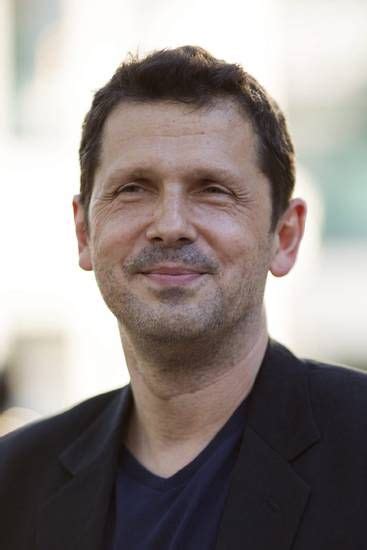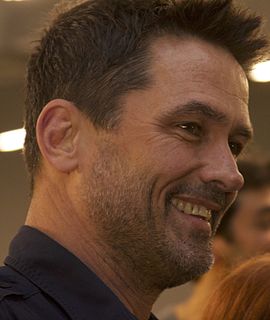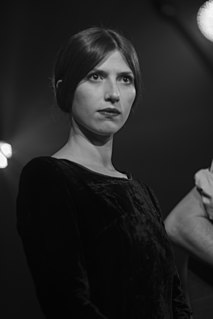A Quote by Peter Webber
I think there's a real problem if you're making a film - some people have done whether it be about Jackson Pollock or about Picasso - it's difficult for actors, because they have to impersonate a person whose image is very strong in our memories or in our consciousness. It's something that's very tricky, I think.
Related Quotes
We have to do something about the cartels. I did talk to [Enrique Peña Nieto] about it. I want to help him with it. I think he's a very good man. We have a very good relationship.He seemed very willing to get help from us because he has got a problem, and it's a real problem for us. Don't forget those cartels are operating in our country. And they're poisoning the youth of our country.
Actors can be very precious about their work and their scenes, but I think good actors have a strong understanding of narrative and are very often not as precious about that stuff. They just can't be because they understand what makes for a better film, and that it's the job of the actor to work toward that, and then if you want you can go to acting class or workshops. But making movies is not workshops.
I left film because I felt that photography was my art. It was something I could do on my own, whereas film was so collaborative. I thought as a photographer I could make something that was artistic and that was mine, and I liked that. And it wasn't until I got back into film and I have very small crews and I could do very tiny filmmaking that wasn't 100 people that I still felt that I was making something artistic as a filmmaker. So, you know, I'm an artist, and whether it's photography or film, I want my voice to be there and I think my voice is very strong in this film.
There has been abroad many times some criticism of our Government, of our people, and our ways, but that has demonstrated, I think, that when they are in real trouble and real difficulty over there, they turn to us as a nation that will be fair with them--one in whose judgment and in whose character they can rely; and that not withstanding differences that have seemed to exist, they are willing to abide by the faith that they have in us, and I think that is a very substantial accomplishment.
We actually needed the memory - if you see the film - as a very different kind of a plot device of revealing some information to our main character. So we chose to represent it as these sort of beautiful little snow globes, which kind of, weirdly, that's the way we think of memories - at least, most of the folks that we talked to. You think of these memories as being very pure and absolute and unchanging. That's not actually real life.
I think whatever is going on with my brain, I'm very, very - and I'm not saying this as a positive thing, it's just a fact - I'm very creative. I have a very strong imagination, and have since I was a little kid. That is where a lot of my world comes from. It's like I'm off somewhere else. And I can have a problem in life because of that, because I'm always off in some other world thinking about something else. It's constant.
Some people think elections are a game: who's up or who's down. It's about our country. It's about our kids' future. It's about all of us together. Some of us put ourselves out there and do this against some difficult odds. We do it, each one of us, against difficult odds. We do it because we care about our country. Some of us are right, and some of us are not. Some of us are ready, and some of us are not. Some of us know what we will do on day one, and some of us haven't thought that through.
I've done my share of reading about Abraham Lincoln, throughout my life, and he wasn't always carved in stone. He was a human being. He was a very thoughtful, self-educated, complex, magnanimous human being, who was very, very strong, very smart and very canny, with a very strong sense of what was right and what was wrong. Through all that, he's become an icon, over the years, and some of his warmth and humanity has been lost. You don't tend to think of Lincoln as this warm, funny person, but he was.
A whole lot of us go through life assuming that we are basically right, basically all the time, about basically everything: about our political and intellectual convictions, our religious and moral beliefs, our assessments of other people, our memories, our grasp of facts. As absurd as it sounds when we stop to think about it, our steady state seems to be one of unconsciously assuming that we are very close to omniscient.
If, for instance, you put in a Malay officer who's very religious and who has family ties in Malaysia in charge of a machine gun unit, that's a very tricky business. We've got to know his background... I'm saying these things because they are real, and if I don't think that, and I think even if today the Prime Minister doesn't think carefully about this, we could have a tragedy.
You also convert real memories, whatever that means, into film versions of those memories. Because by the time you've finished the project you can't remember the real memories anymore, you just remember the film versions of them. And then if the film failed you have distaste for them. So I don't think about that stuff anymore.
It's been a very strong force for me over the years. I don't know exactly why. For some people, fear can be a very useful thing. They can use it to recognise there's something missing, and heal themselves. But fear can also destroy some people. I think I'm the first type of person. I'm pretty anxious, always thinking 'what if?' about the bad stuff.




































